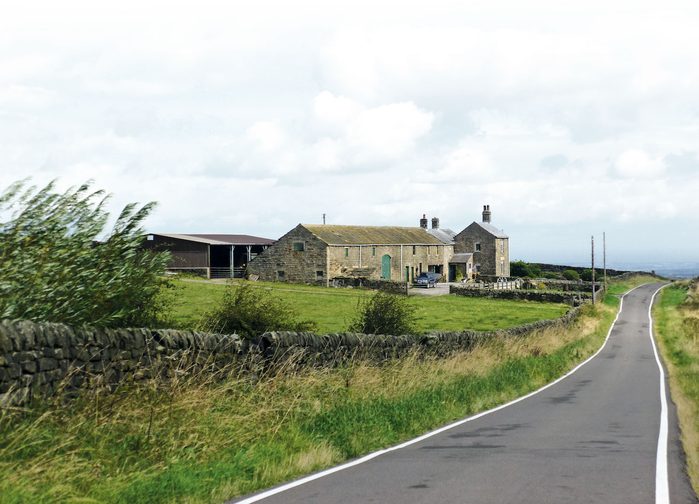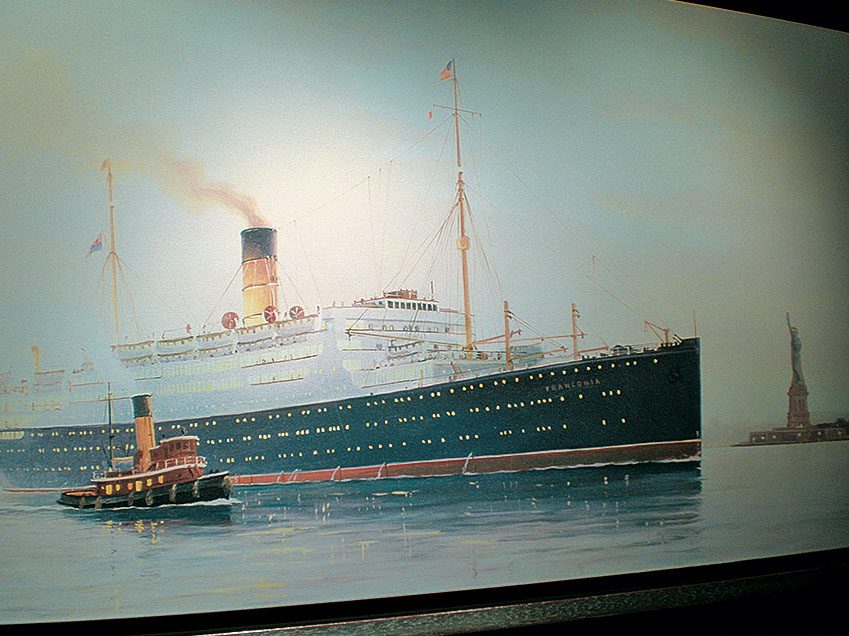
Happy to Be Here
It was mid-October of 1954. I remember standing at the rail of the Cunard Line ship of the Franconia as she slipped her moorings and headed to the new world. My mother, Muriel Thorpe, was crying as she gazed at the receding skyline of Liverpool, probably wondering when, or if, she would see England again. We were sailing to join my dad, Adin, who had left our Yorkshire farm six months earlier to get a job and to buy a home for us in Canada.
We ran into turbulent weather on the North Atlantic. Our ship was tossed about on the angry sea more than usual because there was a dock strike in Liverpool and the Franconia wasn’t carrying enough ballast to ensure a smooth sail.
Each day, the ship’s dining room was almost empty; only my younger brother Fred and I, and a few hardy souls, graced the tables. I was fascinated when watching the stewards latch the three-inch table lips into position when the rolling got particularly bad. We enjoyed watching all the cups and plates slide gracefully from one side to the other, but amazingly very little was broken. I also distinctly remember how watermelon tasted—I had never even seen it before in my life. My, it was good! Also, we were allowed to eat a whole banana for the first time. This being very soon after wartime rationing in England, one banana had always been shared between our family of four.
We spent out day out on the decks, and as the wind swirled around us, a kindly steward went around with his wagon offering beef tea to passengers (a broth, probably made in the ship’s kitchens from beef roasts). What a treat! Was this how it was in the 1920s and 1930s when the aristocracy crossed the oceans?
As a girl of 12, I followed our progress on the ship’s charts that were posted daily on the Promenade Deck, and loved the scenery as we sailed down Belle Isle Strait into the Gulf of St. Lawrence. By the time, we reached Canada, Mother was positively green. She was not a good sailor at the best of times. Indeed, in later years, she was seasick on the BC Ferry from Vancouver to Victoria!
In Montreal, a burly porter was manhandling our luggage at dockside.
“Where ya goin’? Tronna?” he asked.
“Oh, no,” Mother replied, ins her polite, English ladylike voice. “We’re going to Toronto,” (with the T’s being definitely pronounced). The man just shook his head. He probably regaled his family at dinnertime with tales of these strange English immigrants.

We caught the train to Toronto, where Mother took us for lunch in Eaton’s cafeteria. I wonder how she knew to go there, to find her way from Union Station; in 1954, there were no GPS instructions. We ordered beef with two vegetables, and when we tasted the boiled cabbage on our plate, it needed seasoning. We didn’t see any salt or pepper shakers on our table, but what we did see was a tallish, round glass jar with a chrome top containing what looked like coarse salt. We sprinkled it on our boiled cabbage. Well! We were so embarrassed at our mistake that we ate the cabbage anyway. Since this “sugared” cabbage, I’ve rarely eaten the lovely vegetable; and thank goodness those massive sugar dispensers largely went out of style. Later, we bought food in the London, Ont., train station for the last leg of our journey to Sarnia. The bread used in the ham sandwiches tasted sweet. I think it must have been our first taste of Wonder Bread, which we subsequently referred to (privately) as “that blown-up stuff.”
Still in Eaton’s, we were intrigued by the large amount of merchandise on display, and were puzzled at the sight of so many masks with fancy dress or ghoulish outfits. Our second night in our new home, little ghosts and goblins came knocking at our door, and it was only later that we understood what it was all about. Our first Halloween!
it was so exciting to enter our new home—a cottage that Dad had bought for our arrival in Corunna, just south of Sarnia, Ont. It was right on the River St. Clair. Mother took one look out of our front windows and dashed for the bathroom. She was seasick again, saying later that water, water everywhere was just a bit unnerving after the storming ocean voyage.
Up early the next morning, I cried at the breakfast table.
“What’s wrong? Don’t you like Canada?” asked my concerned parents.
“It’s my birthday and nobody remembered,” I sobbed. I guess my parents were distracted with seeing each other again after six months and establishing a new home in a new country. In the subsequent years, Mother and Dad more than made up for the 1954 birthday oversight.
I have always been deeply grateful to my parents for having the courage to leave “home”—our farm in Bradfield, near Sheffield in Yorkshire, England, where our forebears had tilled the soil for generations—to start life in an new country. My mother was trained as a nurse in England, but upon her marriage she became a farmer’s wife and stayed at home. When she arrived in Canada, she got a job as a “helper” in a retirement home in order to assist with household finances. Although my dad was a farming in England, he was always mechanically minded. He got a job with Sarnia Cranes as a cranes operator, but first served as a “labourer.” He could hardly wait to get to work in the mornings, he was so enthusiastic. His pay was $65 a week and he thought he was in heaven!
Before they passed on, I had the chance to say to them, “Thank you for giving us the opportunity to lead such a good life in Canada, along with the many happy memories that we made along the way.”